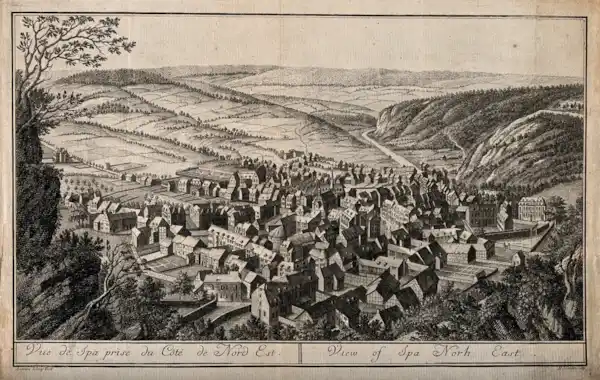Has your family tree research led you to ancestors in Belgium? Rasmus Dahlqvist of Belgian Ancestry Help shows you how to get started and discover the Belgian section of your family tree.
Has your family tree research led you to ancestors in Belgium? Rasmus Dahlqvist of Belgian Ancestry Help shows you how to get started and discover the Belgian section of your family tree.
Even if you have a lot of experience looking for your ancestors in your own country you will always have to rethink your research methods when looking for your forebears abroad. Any neighbouring country has its own organisation of the archives, a legislation different from the UK, a different history, and last but not least probably a language other than English. Although Belgium is only a channel away from the UK, it is genealogically and historically speaking a world apart. We always advise people to plunge into the history of the country, province, region, or village they suspect their ancestors to have come from.
The entity now known as Belgium in particular had a varied number of rulers, kings, emperors and invaders, all of whom imposed their own law and legislation. Starting with Julius Caesar who in his book Commentarii de Bello Gallico wrote "Horum omnium fortissimi sunt Belgae" i.e. "of them all, the Belgians are the bravest".
Next to rule were the Burgundians, then the Habsburgs, and a varied list of emperors, kings, invaders, and rulers from The Netherlands, Spain, Austria, France, and following two German invasions, Belgium is now an independent nation firmly attached to the EU. A lot of history!
All these government changes have had their influence on lawgiving and legislation that determine the system we know at our time, and this influences the way the archives are kept. Roman law still forms the basis, as well as the Roman Catholic faith influence, for instance the Council of Trent (1545-1563) held in northern Italy, one of the Roman Catholic Church's most important councils which among many other things stated that baptisms, marriages and funerals had to be recorded in registers. Only around 1600 was this rule widely followed in the Low Countries, including the region that was later known as Belgium.
Pre-French Revolution records
The most commonly used basic genealogical resources covering the Ancien Régime (the period before the French Revolution) were made and kept by parish priests. These records, if resisting the ravages of time, date back to the 16th century. A larger city would of course have several churches or parishes which produced separate records. The "Eternal Edict" of 1611 by Archdukes Albrecht & Isabella, ordered all aldermen to annually produce a certified copy of the parish registers. Unfortunately, this was ignored in some regions, despite later urgent reminders. In 1754 Empress Maria Theresa of Austria imposed a powerful decree on all village priests to make duplicates of the records and deliver them to the local government.
The French Revolution and the annexation of the Southern Netherlands by Napoleon Bonaparte (imposing the “Code Napoléon”: the French Law) resulted in baptisms, marriages and burials being replaced by civil births, marriages and death registrations and a new kind of record appeared: divorces.
![]() Online records
Online records
The civil records were and are indexed every 10 years. Most records, both parish and civil, can be nowadays be found online, although there is no national register or index. The national archives' website does allow access to microfilmed/scanned records, but the indexes are made by volunteers, resulting in a scattered and incomplete database. This is very different from the Dutch (Netherlands) approach where records are transcribed by officials in chronological order. Many keep searching for a national census for Belgium; well… there isn't one.
You will need to know or find out the Belgian village, or region, or province where your ancestors lived in order to obtain fast results. One key restriction is the privacy law. Civil status registers less than 100 years old cannot be accessed at State or City Archives. You can request an excerpt or copy of documents from the civil status office of the municipal administration that preserves the records in question and in some cases you will have to obtain an official permit from the so-called Family Court of the legal Canton involved. But where to go from there?
So many questions need answering. Why did your ancestor leave Belgium? Diving into local history can explain things. What can be found except for the "dry" dates and places? There are a lot of other sources you could consult: military records, old tax records, poor-house lists, land register, newspaper archives, and old phone books, mostly kept at local genealogical or regional historical associations. But most is still buried in provincial or municipal archives.
Genealogical societies and associations
Genealogical associations will charge you for a membership, or charge fee per researched document or their time. The benefit of consulting a local genealogical circle or company is that they have their local people are able to look for very local, unindexed and off-line records.
One such organisation is Familiekunde Vlaanderen, a non-profit cultural heritage organisation supported by the Flemish and Brussels governments, driven by specialised volunteers. They keep a varied collection of information regarding local history, ancestry and heraldry in some 20 local documentation centres. For research in Wallony, GéniWal is the largest Walloon genealogical association. They manage an online tool containing genealogical data from digitised records entered by volunteers.
Apart from those, there are a lot of cities and towns that run their own official local city archive, although many require you to actually visit the city hall and look for what you need yourself. Some archives are quite well organised, like the Felixarchief of the City of Antwerp. Other specialized archives include the Episcopal archive, the Royal Museum of the Army and Military History, etc. Again, you will need to have at least an idea of the place your ancestor lived or came from. Asking "can you tell me who my ancestor is, he lived in Belgium about 1850" will probably lead you nowhere.
Belgium has its own particularities regarding the language used in records: Latin in the old parish records, and French or Dutch (sometimes even German) in more recent civil records. The language subtleties are in many cases crucial. We have seen English-speaking genealogists who succeeded in retrieving records but who had no clue that important extra information was actually included in those records. Understanding foreign languages will in many cases reveal valuable details. A note in the margin, even a single word form, a profession, or the name of a witness prove to be vital for further research. Hiring a reliable professional can do wonders for your research.
Enjoy a wealth of help and advice with family history workshops at Family Tree Live - tickets on sale now.
Belgian Ancestry Help
Belgian Ancestry Help can help you to discover your Belgian ancestors and to find out more about how and where they lived. Whether you need help in finding particular records, assistance in overcoming a research challenge concerning your Belgian ancestors, or help in analysing records that you’ve found, contact Belgian Ancestry for a free initial assessment. Full details and the pricing structure can be found on the website.
(images copyright Wellcome Collection)








 Online records
Online records.jpg)